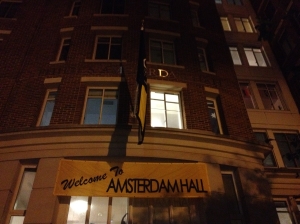By lizalunstroo
As a short introduction to the topic of culture shock, I recall a conversation at our dinner table in one of the first weeks here at GW – my roommates and I were having dinner together.
V: “We used to eat those specific kind of noodles all the time..., you know, those long, flat, thin, white noodles.”
L: “Like Me?”
V, puzzled: “You?”
L, confused: “Me?”
V, mystified : “What do you mean, like you?”
L, bewildered: “Huh, why, like me?”
V: “yeah, you said: like Me, so what do you mean, like you?”
By this point of the conversation the other two roommates, who were whipping their heads from V to myself like we were at a tennis match, were almost under the table with laughter. Once V and myself saw how bizarre a turn the conversation had taken we looked each other in the eyes for a moment after which we both cried with laughter for the next 30 minutes. Of course, the crux in this conversation is that I am not talking about myself at all, but about the specific kind of noodles V was talking about – Mie. However, due to the implications of the English language, V thought I was talking about myself when she was describing something as long, flat, thin... You get the point.
Of course, this is a simple misunderstanding, ending in hysterical laughter among friends, but in a different context, certain misunderstandings could escalate. However, in terms of actual culture shock, I have to admit that the cultural differences between the USA and the Netherlands are not that big. In general, we have the same values and ways to go about things. For instance, the personal space Americans appreciate when talking to one another, is something I completely endorse, and conversation topic taboos here are the same – do not make inappropriate political-sensitive comments when you do not know the other person that well.
(I think this is a cultural faux pas that many people commit, but, luckily, students at GW do so themselves as well – it is completely normal here to have a political discussion with people that you only met once or twice. DC is, in that sense, an exception to the rule, or so I’ve been told, and that makes sense: being the political capital of the country, people are bound to have an opinion.)
Yet there are some habits I had to get used to. For instance, American people are really into making superficial small-talk. As a general rule, when meeting people, I learned the standard greeting here is ‘Hi, how are you?’ (a question you NEVER answer, but reply with ‘Hi, how are you?’), and ‘It’s nice to meet you.’. To be sure, I have already adapted unconsciously - I caught myself using the same phrases (and others) that I would not have used had I not come here.
Little quiz: did I hit or did I miss? – Answer will be up next week
Another difference are the types of sports that are really hot here, but those cannot account for a culture shock – it is more fun than shocking. Now, this is not my area of expertise, but it is generally known that Americans are really into baseball, American football and ice hockey. Unfortunately I could not come to the organized trip to an American baseball match because I had to attend class, but I did go to the practice session that was held prior to that trip, to ensure everybody more or less knew what the game was all about. This was really fun – just playing a bit of baseball (not with the actual equipment – we were too amateur for that), and relaxing on a sunny Saturday afternoon – the photo illustrates my very fanatic attitude that day.
As a conclusion then, I did not encounter a culture shock here, or maybe I am just really good at denying this, but I can honestly say that so far I have enjoyed most differences between home and DC. I am not saying that the differences are better, nor are they worse – they are just as good. I am definitely looking forward to the very American holiday season that is about to start – we’ve got Halloween, Thanksgiving and Christmas coming – and to the culture shock any of those might hold for me.


